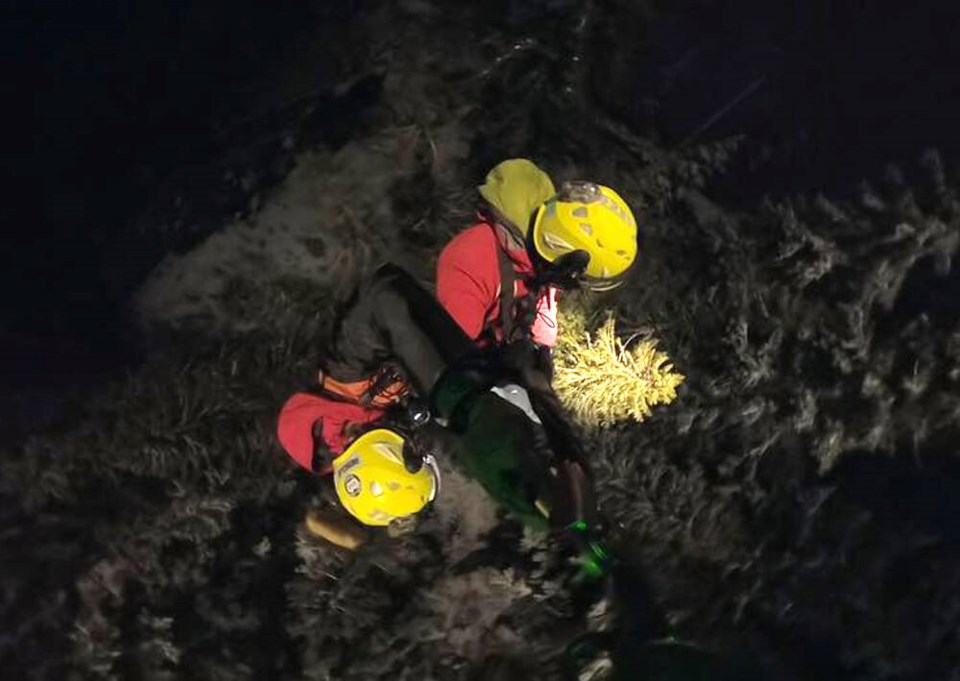It’s impossible to separate the mountain ranges that dominate our landscape from the brave volunteers who work to recover people caught in the treacherous terrain.
Cathalynn Labonté-Smith’s new book Rescue Me tells the stories of search and rescue workers across North America. Those include the helicopter missions often featured in the pages of this newspaper, as well as rescues carried out by cavers, divers and horseback riders.
By recounting their most memorable experiences, Labonté-Smith underscores the huge emotional weight associated with the work, and the resilience required of search and rescue members.
The author said she became interested in the topic after her husband Stephen started training for Sunshine Coast Search and Rescue in 2020. That same year, docuseries was released by the Knowledge Network.
Labonté-Smith wondered: Why isn’t there a book?
She knew about search and rescue operations in sa¹ú¼Ê´«Ã½, but wanted a more complete perspective. “So I contacted all the search and rescue in North America that I could possibly find,” Labonté-Smith. “Anyone who responded, I interviewed.”
Divided into sections based on rescue types, the book includes SAR members in Ontario, Washington, California, Colorado and Maine.
Labonté-Smith said she wants to make people aware of the work and that it’s being done by volunteers. “I don’t think a lot of people realize that until they started reading my book,” she said. "I don’t want to suck the joy out of people’s adventures ... I just would like them to reflect on these stories, and maybe apply some of the lessons learned to their own practices.”
Mike Danks: A breakdown and back again
A number of pages are dedicated to North Shore Rescue, the largest SAR organization in sa¹ú¼Ê´«Ã½, and its team leader Mike Danks. An account in the “avalanches” section of the book recalls one of Danks’s hardest calls.
After a long career of being a stoic firefighter and SAR member, Mike remembers his life-changing call-out a few days before Christmas in 2013 on Unnecessary Mountain above Lions Bay.
Seven-year old Erin Moore, her sister and her mother were hiking with a large group. About halfway into the ten-kilometre hike, there was a rockslide on the trail. Erin was stuck by boulders and cover by debris. The group unburied her and performed CPR. Nurses who had hiked in by foot, and a helicopter with a doctor and a paramedic onboard, came to Erin’s aid. Unfortunately, despite all their efforts, Erin was pronounced deceased at the scene.
“I looked into her eyes,” said Mike, who was one of the rescuers trying desperately to save the little girl. Later that evening, as he tucked his own seven-year-old daughter into bed, he looked into her eyes and was deeply shaken.
Labonté-Smith writes how the stress from balancing his job, volunteering at NSR and raising three kids all peaked in that moment of sorrow. He dealt with his breakdown by attending a resilient-mind retreat, available through the fire department.
It reset his life, and he could finally talk about the horrific calls like Erin’s.
“It was a game changer for me. I could bring it back to my colleagues at the fire department and at NSR – that you don’t need to be afraid to talk about the tough calls.” His breakthrough moment was when he realized that for the sake of his mental health, he didn’t need to go to every call-out.
Calls involving children are particularly hard, Labonté-Smith said.
“When that kind of call comes in, everybody is on high alert and puts everything into it – like they do every call. But when it’s a child, even more so,” she explained. “It’s more traumatizing, and the [critical incident stress management] teams come in, if there’s a poor outcome.”
Danks has come back from that. “They don’t like using words like heroic and hero, but it’s hard not think of those words when you think of Mike.”
On Jan. 28, Labonté-Smith joins The Broken Places author Frances Peck for at West Vancouver Memorial Library.
